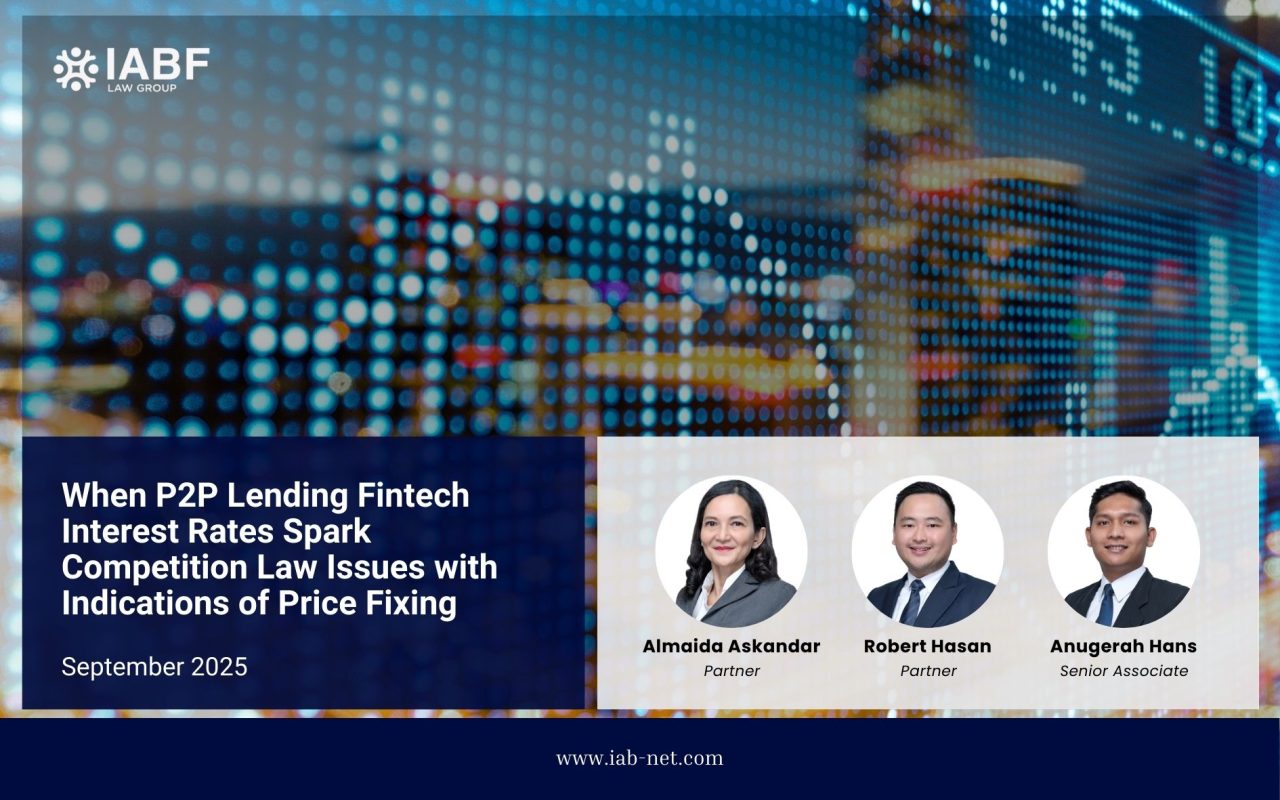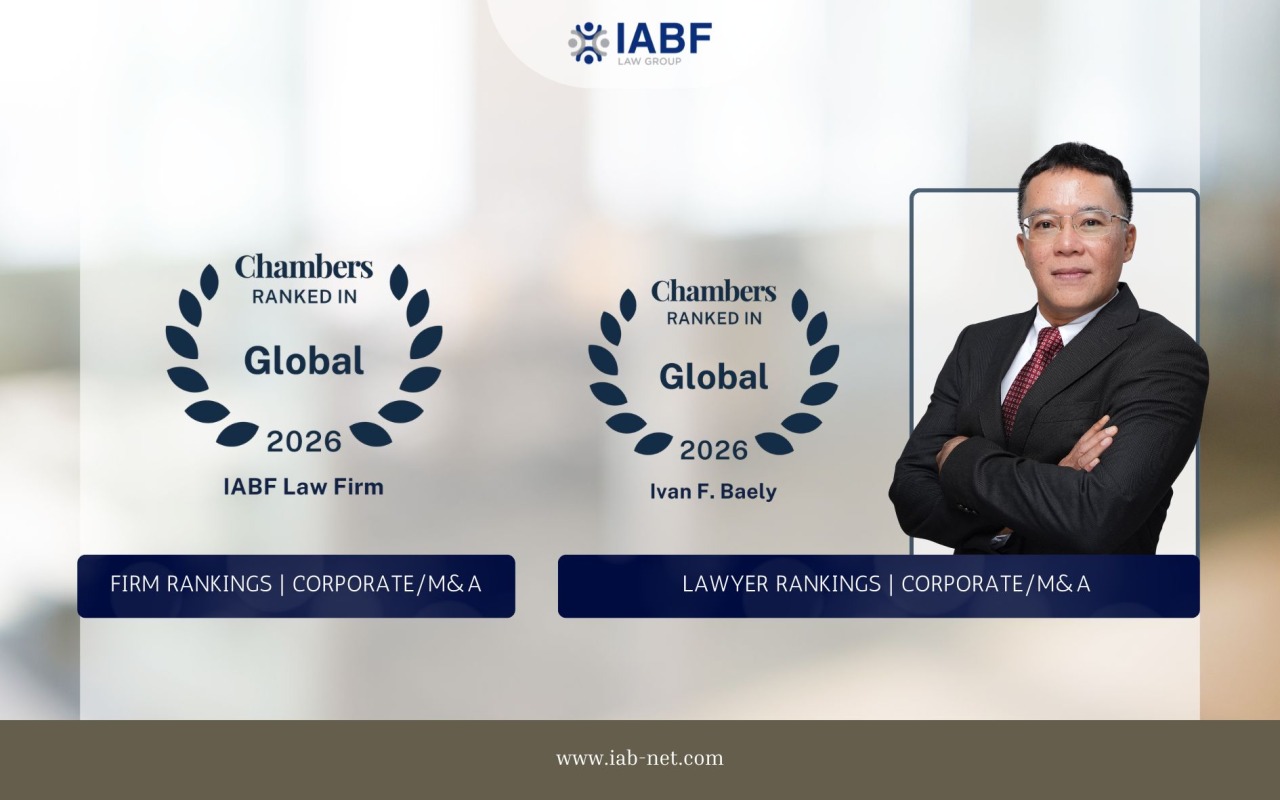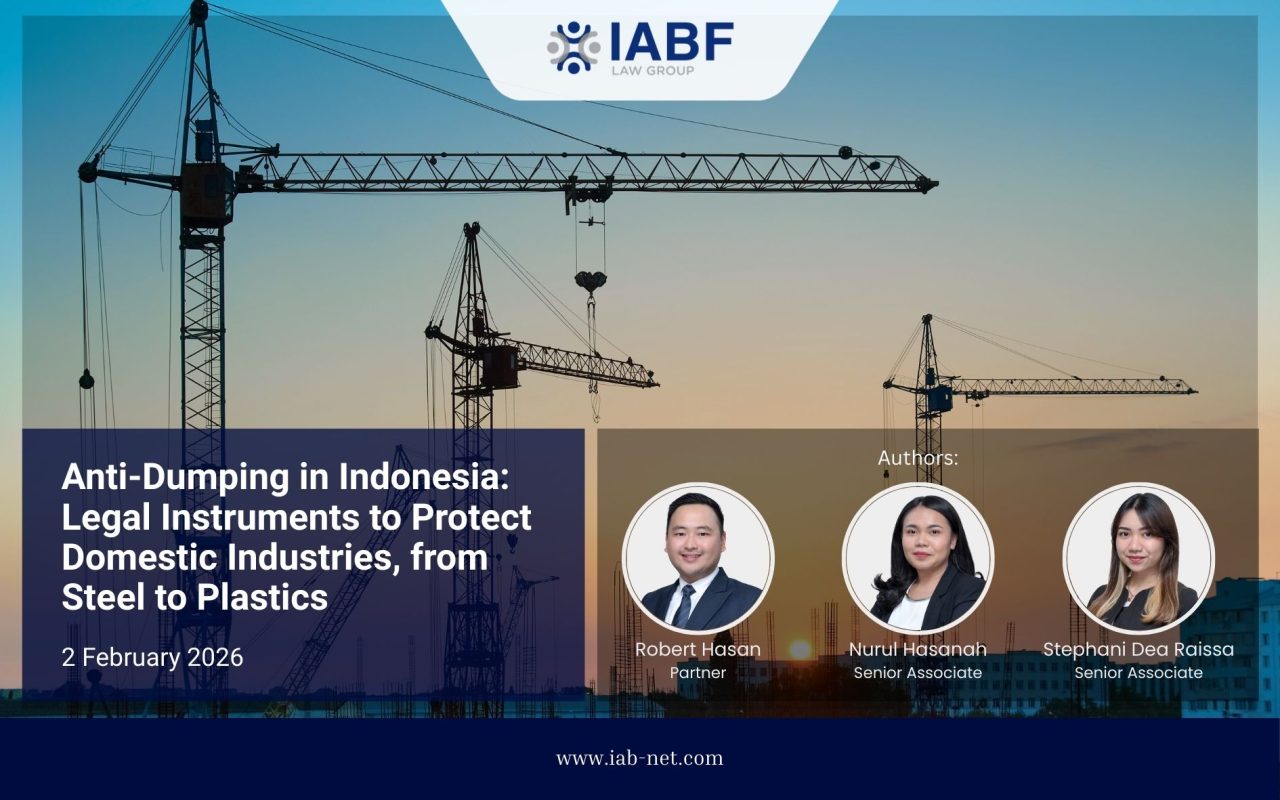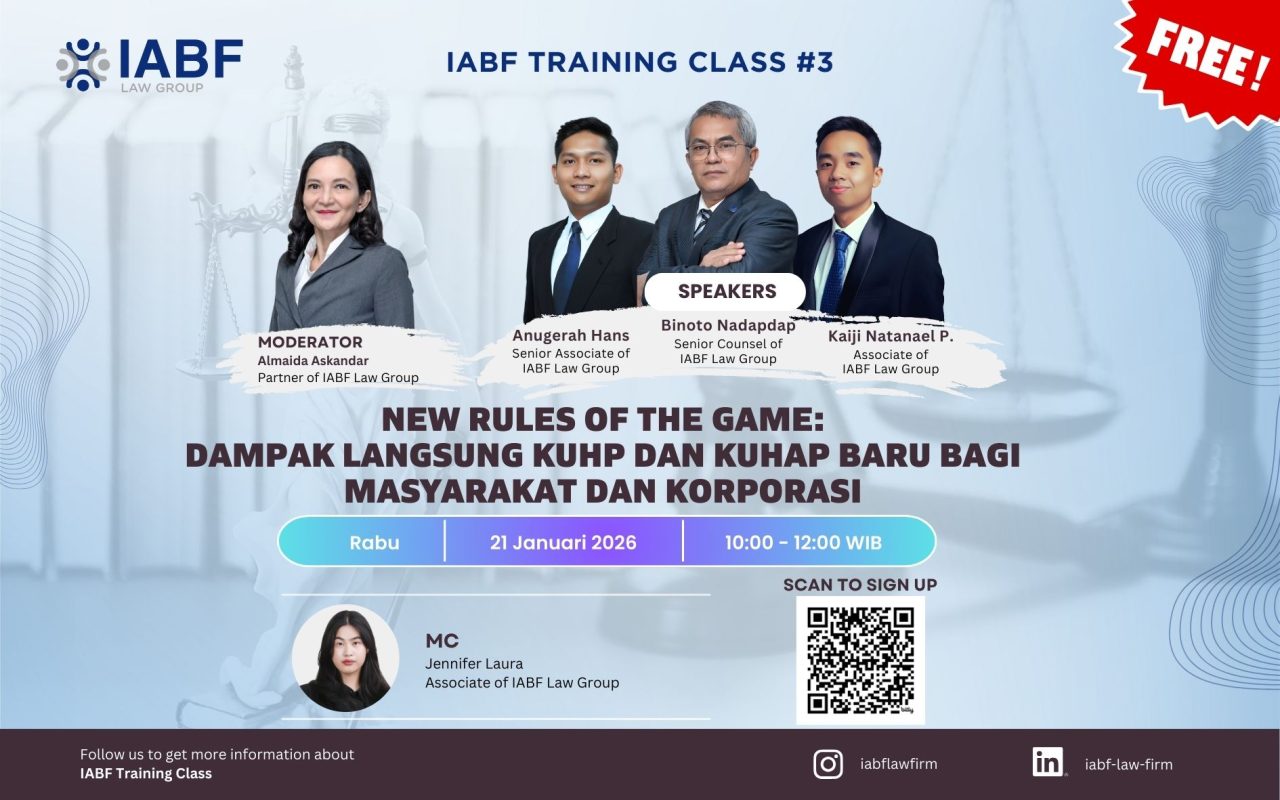When P2P Lending Fintech Interest Rates Spark Competition Law Issues with Indications of Price Fixing
Almaida Askandar, Robert Hasan & Anugerah Hans
The development of financial technology (fintech) in the last decade has brought new dynamics to the Indonesian financial industry. One of the most rapidly developing innovations is peer-to-peer lending (“P2P Lending“) services, which have been available in Indonesia since 2016.
However, despite the benefits it offers, the practice of P2P Lending is now entering a crucial phase in the realm of competition law. The issue arose when as many as 97 (ninety-seven) P2P Lending providers affiliated with the Indonesian Joint Funding Fintech Association (“AFPI“) were reported to the Business Competition Supervisory Commission (“KPPU“) for alleged price fixing through the setting of loan interest rates.
This allegation refers to Article 5 of Law Number 5 of 1999 concerning the Prohibition of Monopolistic Practices and Unfair Business Competition (“Competition Law“). KPPU has followed up by summoning the providers as Respondents in the Preliminary Examination stage, and the first hearing was held on 14 August 2025, with the agenda being the reading of the Alleged Violation Report.
P2P LENDING REGULATIONS AND THE ROLE OF ASSOCIATIONS
P2P Lending is regulated, among other things, through Financial Services Authority Regulation Number 40 of 2024 concerning Information Technology-Based Joint Funding Services (“POJK 40/2024“). The nomenclature used by POJK 40/2024 for P2P Lending is Information Technology-Based Joint Funding Services (“LPBBTI“). LPBBTI is defined as the provision of financial services to connect lenders with borrowers for funding, whether conventional or based on Sharia principles, directly through an electronic system using the internet.[1]
In the P2P Lending scheme, there are three main parties: (i) the Provider; (ii) the Lender; and (iii) the Borrower. In this case, P2P Lending providers are required to be registered as members of an association approved by the Financial Services Authority (“OJK“).[2] Based on OJK Letter No. S5/D.05/2019 dated 17 January 2019, AFPI is mandated as the official association of P2P Lending providers.
The association plays a role in building market discipline-based supervision for the strengthening and/or improvement of Providers and in assisting with the management of consumer/public complaints. The association has at least the following duties[3]:
- coordinate and establish codes of conduct;
- coordinate input from the industry in policy formulation and industry development;
- conduct continuous education and training; and
- other duties as assigned by the Financial Services Authority.
In carrying out its role, the Association is required to have and enforce a code of ethics and conduct guidelines that P2P Lending Providers are required to adhere to.
ECONOMIC BENEFIT (INTEREST) LIMIT BASED ON OJK REGULATIONS
The report against 97 members of the AFPI association relates to the setting of loan interest rates. From a legal perspective, interest in P2P Lending is categorized as an economic benefit in facilitating funding.[4]
As for the Financial Services Authority (OJK), it has regulated the maximum economic benefits of P2P Lending through OJK Circular Letter Number 19/SEOJK.06/2025 of 2025 concerning the Implementation of Information Technology-Based Joint Funding Services, as follows:
1. for productive financing, namely:
a. the highest funding value is Rp50,000,000.00 (fifty million Rupiah):
-
- at a rate of 0.275% (zero point two seven five percent) per calendar day of the funding amount stated in the funding agreement for tenors up to 6 (six) months; and
- at a rate of 0.1% (zero-point one percent) per calendar day of the Funding amount stated in the funding agreement for tenors exceeding 6 (six) months.
b. the funding value is greater than Rp50,000,000.00 (fifty million Rupiah) at a rate of 0.1% (zero-point one percent) per calendar day of the funding value stated in the funding agreement, regardless of whether the tenor is up to 6 (six) months or over 6 (six) months.
2. for consumer financing, namely:
a. at a rate of 0.3% (zero-point three percent) per calendar day of the funding amount stated in the funding agreement for tenors up to 6 (six) months; and
b. at a rate of 0.2% (zero-point two percent) per calendar day of the funding amount stated in the funding agreement for tenors exceeding 6 (six) months.
PROHIBITION OF PRICE FIXING PROVISIONS IN ARTICLE 5 OF THE COMPETITION LAW AND ITS RELEVANCE IN THE CONTEXT OF THE DIGITAL MARKET
The interest rates charged by P2P Lending Providers have raised antitrust legal issues due to alleged price fixing, as stipulated in Article 5 of the Competition Law.
Article 5 of the Competition Law stipulates that:
(1) Business actors are prohibited from entering into agreements with their competing business actors to set prices for goods and/or services that must be paid by consumers or customers in the same relevant market.
(2) The provisions referred to in paragraph (1) shall not apply to:
a. an agreement made within a joint venture; or
b. an agreement based on applicable law.
In assessing an alleged violation of Article 5 paragraph (1) of the Competition Law, several aspects should be taken into account, as further stipulated under KPPU Regulation No. 4 of 2011 concerning the Guidelines on Article 5 (Price Fixing) of the Competition Law, as follows:
- Price Fixing Agreement
Price fixing is one form of collusion. This means there must be an agreement that results in price equality, where the pricing behaviour of business actors is carried out jointly (concerted). A written agreement is not a requirement to prove the existence of an agreement between business actors.
- The Same Relevant Market
A violation of Article 5 of the Competition Law only occurs if there is a price-fixing agreement between business actors within the same relevant market.
- The Price Paid by Consumers
The price referred to here is not just the final price, but also the agreement on the price structure or scheme. Pricing does not mean setting the same price. For example, if colluding companies have production with different grades, the price agreement can be on the margin (the difference between the price and the cost of production). As a result, the market price can vary for companies with different production grades, but the margin earned by companies in the market will be the same.
- Analysis in the Digital Market
In the context of digital markets like fintech, the issue of pricing cannot be separated from the use of algorithms, big data, artificial intelligence (AI), and machine learning. An algorithm itself can be understood as a set of instructions or rules that are executed automatically by a computer system to process data, make decisions, or provide recommendations. In the technology-based financial industry, algorithms can influence price behaviour, match supply and demand, and shape business strategies.
On the one hand, algorithms can improve market efficiency and transparency. However, on the other hand, algorithms have the potential to be used as instruments to strengthen or conceal cartel practices, for example, through automated pricing, market or consumer segmentation, and real-time monitoring of cartel compliance. The impact of algorithms in the context of business competition is highly dependent on how operators or business owners use them, whether to drive efficiency and innovation (positive) or to exploit them for anti-competitive purposes such as direct or indirect price coordination (negative).
Therefore, when assessing alleged price fixing in the P2P lending industry, it is also important to consider whether there is a role for algorithms and digital technology that accelerates or smooths out price uniformity in the market. This makes the analysis of business competition in the P2P lending sector not only limited to the existence of conventional agreements between providers, but also to the potential misuse of technological instruments in creating price coordination.
INTERSECTION OF FINANCIAL LEGAL ASPECTS OF P2P LENDING WITH BUSINESS COMPETITION LEGAL ASPECTS
If linked to the report of alleged violations regarding interest rate setting in the P2P Lending industry, then the price element in this report will be reflected in the interest rate, where the business actors in question are the P2P Lending Providers who are members of the AFPI association.
Here is the agenda that is currently being or will be implemented, including: (i) preliminary examination with an agenda for presenting the alleged violation report; (ii) follow-up examination that provides the respondent with the opportunity to submit a response; (iii) reading of the Commission’s decision; and (iv) implementation of the decision.
Based on the above, when examining the report, it is also necessary to review the following:
- whether or not there is an agreement among P2P Lending Providers who are members of AFPI to determine P2P Lending interest rates;
- can the guidelines established by AFPI and followed by P2P Lending providers be qualified as an agreement among P2P Lending providers?
- is the setting of interest rates a form of collusion aimed at disrupting competition among P2P Lending Providers and creating barriers for others; and
- can the interest rate set by referring to OJK regulations be categorized as an agreement based on law, as an exception to Article 5 paragraph (1) of the Competition Law?
As for if a violation of Article 5 of the Competition Law is proven, the KPPU can impose sanctions in the form of:[5]
- cancel part or all of the agreement. In this case, the interest rate set in the P2P Lending operation can be cancelled;
- ordering the payment of compensation;
- imposing an administrative fine of at least Rp1,000,000,000 (one billion Rupiah) with the following provisions:[6]
a. maximum of 50% (fifty percent) of the net profit earned by the Business Actor in the relevant market during the period of violation of the law; or
b. maximum of 10% (ten percent) of total sales in the relevant market, during the period of violation of the law.
CONCLUSION
The alleged interest rate fixing case by P2P Lending providers affiliated with AFPI places the fintech industry at a crossroads between compliance with financial sector regulations and the principles of healthy business competition. On the one hand, the OJK has set a maximum limit on economic benefits, which can serve as a justification that the practice of determining interest rates is carried out in accordance with the applicable legal framework. However, on the other hand, the potential for a mutual agreement among the providers raises indications of price fixing, which is prohibited under Article 5 of the Competition Law.
Preliminary examination is crucial to assess the extent to which the provider applies interest, and reference to OJK regulations can be qualified as a violating agreement. The KPPU’s decision will not only impact stakeholders in the P2P Lending activity but will also set an important precedent for regulations and business practices in the fintech sector, particularly in maintaining a balance between consumer protection, industry stability, and upholding the principles of healthy business competition.
Additionally, in the context of the digital market, technological advancements such as algorithms and big data add a new dimension to assessing the potential for unfair business competition. It is no longer sufficient to simply look at the existence of explicit agreements between business operators, but also at how technology can influence price behaviour and market structure. This highlights the need for a competition law approach that is more adaptable to the characteristics of the digital economy.
The KPPU’s decision in this business competition case in the digital era is expected to bring justice to consumers while also maintaining a business climate conducive to the growth and innovation of business actors.
Please contact:
Robert Hasan (robert.hasan@iab-net.com)
Almaida Askandar (almaida@iab-net.com)
Anugerah Hans (anugerah.hans@iab-net.com)
Disclaimer:
This publication is the sole work product of IABF Law Firm and may not be reproduced, distributed, or otherwise used by any party without our prior written approval. The contents provided are intended for general information only and do not constitute legal advice. They should not be relied upon as a basis for action in any specific matter. Interested parties are advised to seek tailored legal counsel to address their particular situation.
[1] Article 1 paragraph (1) POJK 40/2024
[2] Article 80 POJK 40/2024
[3] Article 84 paragraph (2) POJK 40/2024
[4] Article 140 paragraph (1) dan (2) POJK 40/2024
[5] Article 47 paragraph (2) the Competition Law
[6] Article 12 of Government Regulation No. 44 of 2021 concerning the Implementation of the Prohibition of Monopolistic Practices and Unfair Business Competition
__________________________
Published by: IABF Law Firm
Published on: 08 September 2025



